Varrock

Varrock, originally known as Avarrocka, is the capital of the massive kingdom of Misthalin, and it serves as a major travel hub for merchants, artisians, diplomats, adventurers, and militants. Varrock is easily one of the busiest and most vastly populated cities by players in all of RuneScape. Stretching from the border of the Wilderness to the quiet farmlands of southern Misthalin, Varrock is the second largest and most populous city in the known world, the largest being Meiyerditch. Indeed, the city is often one of the first destinations of those fresh from completing Troll Warzone, and it is here that they truly begin to learn the ways of the world. The city is seen by many as the leading economic, technological, political, cultural, and military force in Gielinor. Varrock is viewed by many, including, it would seem, Jagex themselves, as the capital of Gielinor. It is commonly used for player traders. Varrock also has a great variety of Shops, from the Grand Exchange to equipment stores for any of 3 combat classes. It is one of the three cities to have their own newspaper - the Varrock Herald -, the others being Port Phasmatys and East Ardougne.
Overview
Economy
Varrock's position near trade routes such as the River Lum makes it an ideal point of gathering for traders and merchants. Misthalin is a nation split largely in two; The city of Varrock itself and the Lumbridge/Draynor area. Lumbridge and Draynor have proven to be largely agricultural, while Varrock is somewhat more advanced in nature, focusing on industry and trade. Although the city does produce a somewhat large amount of crops itself, much of the city's food supply comes from the neighbouring settlements that make up much of Asgarnia and Misthalin. Other goods are imported from nearly every nation in Gielinor.
The city also exports many important resources. Its goods are often recognised as superior, often fetching a higher price than those crafted in other areas. One of the city's largest exports is metal armour. The city also produces large amounts of timber, as is evident in the Lumber Yard north-east of the city. Crops are also exported, although most are kept within the city to feed the masses. Varrock exports "some of everything", as can be seen from the vast amounts of traders going to and from the city with exotic goods.
The fiefs of Varrock are amongst the most important in the world, producing the nation's currency, known most simply as coins<ref name="God Letters 1">Jagex. "God Letter 14 - The Return of Saradomin, Miscellaneous Answers." RuneScape god letters. *</ref>. The Varrockian coin is, much like the rest of the world's coins, crafted from gold. On one side of the coin is the Varrockian crest, whilst on the other is depicted the famed Shield of Arrav.<ref name="God letters 2">Jagex. "God Letter 13 - Guthix Maintains, Miscellaneous Answers." RuneScape god letters. *</ref>
Perhaps the city's most important aspect is its capacity for trade. Thousands of players travel to Varrock each day, where many sell their goods in the city's bustling streets. The city's dependence upon trade can be seen most clearly at the Grand Exchange, the trade capital of Gielinor. This market, which is by far the largest in the known world, allows players to buy and sell goods across all worlds and to all players.
Politics
Varrock is currently under the rule of King Roald and his wife Queen Ellamaria. Varrock, being a monarchy, King Roald's job is quite burdensome, and although he is a popular king that seeks the best for his people, he has become quite dependent on his advisors. This has caused criticism from some of the city's residents. Aeonisig Raispher, King Roald's religious advisor, has recently been criticised for his views on the Edicts of Guthix, which are currently preventing a war between Misthalin and Morytania. Believing that a war of such magnitude could result in the destruction of the world, Aeonisig has convinced the king not to declare war, although a mercenary protocol was recently instilled. Despite some flaws, King Roald is generally popular amongst the city's community. The city's anti-Zamorakian policy, however, makes him a constant target for assassination, and only the protection of the Varrock Palace Secret Guard keeps him safe. But even though King Roald has plenty of guards for protection, he usually panics and doesn't have time to talk.
Varrock is a very diplomatic city, and has established ties with most of the world's nations. Varrock is famous for being the beginning of the Bank of RuneScape, a business that, since its creation, has spread to all corners of the world. In modern times, in order for a city to possess any commerce whatsoever, a branch of the Bank of RuneScape is almost always necessary. To have a branch in ones' city, the Bank of RuneScape must approve. Doing so opens up many opportunities for diplomatic ties between the nations, and greatly contributes to Varrock's economy. Partially because of this, Varrock has ties with nearly every nation in the world, including Asgarnia, Kandarin, the Gnome settlements, the Fremennik Province, Karamja, the Feldip Hills, several islands in the Southern Sea, the Kharidian Desert, Tzhaar, Keldagrim and the rest of the Dwarven Realm, and Dorgesh-Kaan. Even areas such as Zanaris, Morytania, Isadfar, and the Wilderness now have banks, though currently not the Ape Atoll.
Military
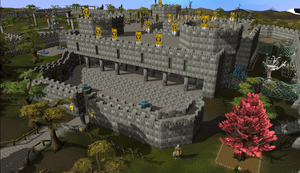
Varrock's military is amongst the largest in the known world, apart from Falador. The threats of Morytania, the Wilderness, and the various Zamorakian organisations (such as the Dagon'hai and the ZMI) in the area are ever-looming and not easy to ignore. Indeed, dawn in Varrock is permeated by a dull green light caused by the sun's rays passing through the swamplands of Morytania in the east, reminding all of the eastern threats.
To combat these threats, Varrock must be ever-ready for war. The city is surrounded by thick stone walls, made more powerful by the presence of spear walls, gate houses, and numerous guards. These large structures and men keep Varrock in total security. The military itself is well-prepared for an assault. The military consists largely of guards armoured in recognisable yellow uniforms. These guards are capable of dealing with some threats, but large-scale assaults require the assistance of the king's knights. Largely elusive, Varrock's knights are rarely seen; only Sir Prysin shows himself regularly. The reason for this is unknown, although some speculate that Varrock's knights are more suited to espionage. The Varrock Palace Secret Guard is also an important military group within the city, as they protect the many important figures that enter the palace, including King Roald himself.
Varrock's military has not been called upon for some years now, and so are currently playing a greater role as guards and policemen. Recently surfaced threats may pose a threat to Varrock, and so the city's army may soon fight once again. Their massive group of men and knights can defeat most armies unless another military grows larger overtime.
Religion
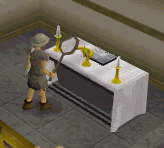
Although the government does not control its people's religious views, nearly all of the city's residents are Saradominists. The importance of Saradominism has been stressed since Varrock's creation, and because of this, the nation's views have changed very little throughout the city's history. The Church of Saradomin holds a good deal of political power in Varrock; though it is theoretically legal to worship Zamorak, the majority of Zamorakians are persecuted, even those who are law-abiding and peaceful, and a Zamorakian priest is currently imprisoned in Varrock Palace, his cell bearing an inscription warning citizens not to worship Zamorak. It is likely that a very small portion of citizens of Varrock worship Guthix. The Church's political strength has at times come in conflict with that of the king's.
After the burning of the first Wizards' Tower, Varrock's prosecution of Zamorakians increased dramatically: as in the rest of the world, those who were once grudgingly tolerated were persecuted and shunned. In recent times, however, the city has become more tolerant. Although Zamorakians are usually shunned by the public, a church dedicated to Zamorak was constructed in the south-east part of the city, though it is unclear as to whether it is a legal organisation or operates in secret. The church suffers a good deal of persecution by residents, and is often vandalized. The most famous of these incidents, perhaps, was performed by the Wise Old Man, who, backed by a group of friends, wrote "Saradomin Pwns" on the side of the church.
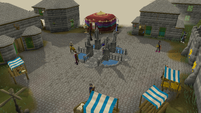
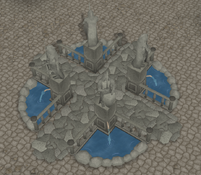
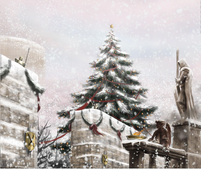
Culture
Varrock's culture is not as obvious as many of the cultures of Gielinor, largely due to the city's large amount of commerce. The city is a melting pot of many different nations and races.
Cuisine
Varrock cuisine varies, consisting largely of grain-based food such as pies, cakes, and pastries. Pastries may be widely arranged in Varrock due to the Chef's Guild and their pies. Other reasons may be just due to NPC's likings. Meat and fish are also immensely popular, with large amounts brought in from Port Sarim every day. Other dishes varying from stew to pizzas are less common, but still popular because of the city's large degree of visitors. The tourists, and individuals come in from different estates, towns, and regions– there is bound to be different likes and dislikes about food.
The cuisine of Varrock has been heavily influenced by the Cooks' Guild that is located just outside of the city. Many cooks that practice and learn at the guild stay and resupply at Varrock meaning the city has been influenced by the constant influx of chefs from the guild.
Some of the city's less wealthy cannot easily afford meat, and so Varrock relies largely on crops grown both within the city and from neighbouring townships such as Lumbridge and Draynor Village. Some of the city's most vital crops include onions, potatoes, grain, tomatoes, grapes, redberries, and cabbage. However, since adventurers have grown more adept at farming in recent years, the city now sees a steady supply of foreign crops such as hops, barley, oranges, apples, sweetcorn, bananas, watermelons, strawberries, curry, lemons, limes, papayas, coconuts, tea, equa leaves, dwellberries, pineapples, and numerous others.
Tea is very popular in Varrock. Most Varrockians drink tea multiple times each day, often becoming part of their daily routines. Also popular are beer and wine, which, although simple, are staple drinks for most of the city's residents. This has created some crime-related problems for the city, although the dwarves are far more fond of ale than most humans.
The Arts
Varrock is a city well known for its artistic history. It is within the city that much of Gielinor's literature has been written, and where many well-known paintings and statues were created.
Varrock is seen by many as the scholarly capital of Gielinor. The Library of Varrock, found within the city's palace, is the most famous in the world, due to its wealth of information. Within the library are the writings of many famous Varrockian historians and scholars, as well as many from further afield. Well-known texts such as the Dagon'hai history, The Tale of Arrav, and the history of the Barrows can all be found within it. Varrockian writers often put a large amount of emphasis on the city's status, praising Varrock and Saradomin. While this does keep the city's morale high, it does often raise of the question of factuality in Varrockian texts. Heroic tales are also popular, telling of legendary Varrockian heroes and explorers such as Arrav, Wally, Dionysius, Samuel Scourduel, and The Seven Priestly Warriors.
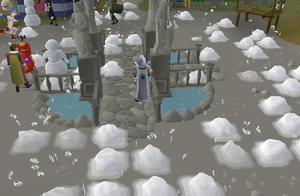
Craftsmanship is also valued highly in Varrock. One of the city's main industries comes from Smithing, which is practised by many of the city's residents. Armour crafted in Varrock is highly valued, being second only to that crafted by the dwarves. Working with stone and cloth is also fairly common. The statues at the city's centre are perfect example of the craftsmanship of the city.
Crime and theft issues
Varrock is the largest of the capitals of the three main human kingdoms, surpassing Falador and East Ardougne considerably. Its large size has, however, given it the highest crime rate of the three. Varrock is split largely in two, with the two sections being quite different. While the north side of Varrock (which includes the Grand Exchange and Varrock Castle) is clean and wealthy, much of the city's two southern portions suffers from a great deal of poverty, urban decay and the presence of stray dogs and pigeons. Most of the buildings are very old and have long since begun to rot and crumble. Those that live on the city's south side are often farmers that have come to the city from the more agricultural areas of Misthalin, only to find that their lack of education prevents them from making much headway.
Many of those in the south side are forced to resort to violence. Muggers, thieves, and gangs roam the streets in numbers too large for the city's guards to suppress. Unfortunately, those on the northern side of the city do little to help this; many are unaware of it in the first place. The city's two most prominent gangs, the Black Arm Gang and the Phoenix Gang, have caused problems in recent years, even managing to steal the Shield of Arrav.
History
Varrock's history is a unique one, one that has largely shaped the world as we know it today. The city was founded in the Fourth Age by one of the Elders of Avarrocka, and was for many years little more than a small farming settlement. Troubled by goblins and aggressive tribes, its existence was always threatened. Only the intervention of heroes such as Arrav and the Seven Priestly Warriors saved it from the threats that constantly lurked on the horizon.
When runes were discovered in the Fifth Age, Varrock ascended to a position of power that left it amongst the most powerful cities in the world. Since then, it has grown into Gielinor's largest city. For a full guide to the long and twisting history of the Varrock, see the History of Varrock article.
Entrances
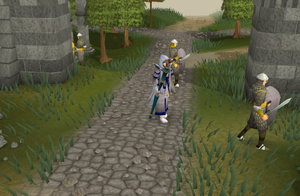
Varrock has four main gates, all of which are open to the public. Each is guarded by several level 21 guards, although they are not aggressive. However, the guards are commonly used to train against for mid-levelled players.
The north gate can be found near the Wilderness wall and is commonly used by those travelling to Wilderness Volcano or exploring the Wilderness. The east gate can be found after following the northern path at the crossroads near northern Al-Kharid. The west gate can be reached by travelling east from the rustic Gunnarsgrunn, although the gate itself is actually very large due to the construction of the Grand Exchange. The south gate can be reached by travelling north-west from Lumbridge. Near it is the Stone Circle, where many level 7 and 20 dark wizards can be found. In the past, these wizards were aggressive and dangerous to players lower than 41, but are no longer so due to the city being a part of the Starting area of RuneScape.
There are also several other less-official entrances. By travelling north from the road east of the Gunnarsgrunn, players can enter the Grand Exchange, and from there the Varrock Palace grounds. An agility shortcut north-west of the Grand Exchange can be used by Members with 21 agility, running two-way between Varrock and Edgeville.
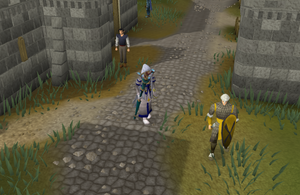
Transportation
Its position as a centre of commerce makes Varrock a vital area. Its success as a city is greatly due to its easy-to-reach location. There are many ways to reach Varrock, ranging from teleports and hot air balloons to hidden underground passages.
- Varrock Teleport - This teleportation method is available if the player's magic level is at least 25 and they have 3 air, 1 fire, and 1 law rune in their inventory. This is the most commonly used method of reaching Varrock and often the most convenient. It is also possible to make teleportation tablets to Varrock in the study of a player owned house. Although somewhat more difficult to obtain, these tablets occupy only one inventory space and can be used simply by breaking the tablet, making them more convenient if they can be obtained. These tablets may also be bought off the Grand Exchange.
- Lodestone - Once players have discovered the required lodestone (located by the south gate) they can use the Home Teleport spell to teleport to Varrock.
- Balloon transport system- South of the Lumber Yard north-east of Varrock is a large hot air balloon. If players have completed Enlightened Journey and unlocked the Varrock balloon route after the quest, they can use the system to reach Varrock for the price of one willow log. This makes it possible to travel to and from the Tree Gnome Stronghold, Entrana, Castle Wars, the Crafting Guild, and Taverley.
- Spirit tree - A magical Spirit Tree can be found within the Grand Exchange, north-east of the market area. Those that have completed the Tree Gnome Village quest may travel to and from areas such as Brimhaven and the Battlefield south of East Ardougne. It is also possible to travel to and from spirit trees planted using the farming skill.
- Fairy Ring - These strange rings of fungi were created by the fairies long ago. Those that have reached a certain point in A Fairy Tale Part II may use the fungi to travel to approximately 43 areas across Gielinor, the most prominent being Zanaris. This particular ring, found just outside the north-west walls of the city, can be reached using the code "D K R".
- Canoe system - This transportation system allows travel to several landing points along the River Lum. Provided the player has the necessary woodcutting level and a usable hatchet in their inventory, they may use the system to reach several areas near Varrock, including an area near the Grand Exchange and Edgeville, the Champions' Guild the Gunnarsgrunn and Lumbridge
- Skills necklace and Combat bracelet - These pieces of jewellery can be used to visit the Cooking Guild and Champions' Guild, respectively. Each has four charges.
- Gnome Gliders - These strange gnomish inventions are capable of transporting players to several areas across Gielinor. Those that have completed the Grand Tree quest may take a glider from the Grand Tree to the forest east of Varrock. The glider will crash, making this trip one-way.
- Portal Chamber - Players with at least 50 construction can build a Varrock Teleportation Portal in their home. Using 100 law runes, 300 air runes, and 100 fire runes, a portal can be made that will allow infinite teleports to the area. You may also use one of these portals in a POH if allowed entry.
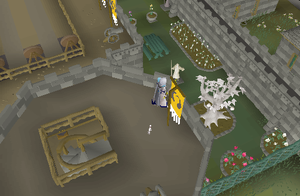
- Transportation Options in Nearby Areas - There are many methods of reaching nearby areas, such as the Senntisten Teleport spell, the Digsite pendant, the skull sceptre, the ancient magicks' Edgeville Home Teleport, and several others. From these places it is possible to travel to Varrock fairly quickly.
- Edgeville Dungeon - A shortcut exists that allows players to travel between Edgeville Dungeon and the Varrock Sewers. Using this, players can exit the sewers and find themselves on the city's east side. This requires 51 agility.
- Mine carts - Players can travel to and from Keldagrim from the mine cart trapdoor located in the north-west Grand Exchange. Players must have started The Giant Dwarf quest to use this method.
- On Foot - There are several entrances to Varrock, outlined in the previous section.
- By the use of a wicked hood that has consumed an earth talisman (or tiara). Choose the 'teleport' option and select 'earth'. This will bring you just south of the lumber yard, fairly close to both east and west gates.
Banks

Varrock's banks are located near the east gate and near the west gate. They are very large buildings, and are easy to spot. They are great places to buy and sell items, as many players tend to congregate at these two banks. There is also a third bank in the Cooks' Guild, which was added as part of the Varrock Tasks.
East Bank
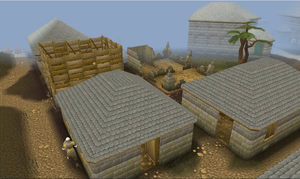
The east bank used to be a very popular place to buy and sell items to other players. Added to the fact that the bank is very small, this resulted in an overly populated bank on busy worlds, which could cause lag on some slower internet connections.
It is often used to bank rune essence, freshly mined at the Rune Essence mine, from Aubury's Magic shop, a little ways south of the bank. As this is one of the fastest ways to get rune essence without buying it, the bank often sees many rune essence miners. The Magic Guild's Zavistic Rarve can teleport to the Rune Essence Mine, but as entry requires level 66 magic and the guild is located in (members-only) Yanille, many prefer Aubury.
Some of the most common items seen for sale here were rune essence, and player killing goods such as food, lower-levelled weapons and armour, runes, and potions. This has however stopped with the introduction of the Grand Exchange.
The east bank also has a second floor. This floor is much quieter than the main floor, but it has a gold statue of the Wise Old Man and maybe the riches he stole in the Draynor Bank Robbery.
Many patrons use the East Bank as a drop off for rune essence or ores from the mine to the south of the bank.
West Bank
This was the first (and then the only) bank in RuneScape. In its early days, the Bank of Varrock stored only gold in its accounts. The West Bank used to be extremely crowded before the update releasing the Grand Exchange, however it still remains the most popular free-to-play bank.
Things such as big bones, logs, feathers, and many miscellaneous items are sold here. On trading worlds, the outside area of the bank is great for buying high level armour and weapons, such as Rune. Further back is a great place to buy discontinued or rare items such as holiday drops and treasure trail rewards.
The west bank also has a second floor and a basement. There is nothing on the second floor, though it is much quieter than the main floor.
The basement contains a south room with coins, one gold ore, one brass necklace, one gold bar, a gold necklace, and a ruby ring behind a locked door. Players who have a Magic level of 33 or higher may use the Telekinetic Grab spell to obtain all the items except for the ruby ring. There is also a spawn of 3 coins on the floor to the north-east of the basement, directly in front of the stairs. The door can't be unlocked and doesn't show as a door on the mini map.
This is also a common place for people who want to improve the smithing skill as there is an anvil directly opposite the bank, in a small run-down building.
A lot of users wanting to sell logs use this bank as a storage, as there are a number of trees on the north-western and south-western sides of the bank.
There is one door that players cannot enter, but which does have a "knock-at" option. This allows players to tell knock-knock jokes to the teller behind the door. If you knock, the teller says "who's there?" and you can then say "Kanga", "Thank", "Boo", or "Doctor" (all of which are references to common knock-knock jokes) to the unamused teller.
Cooks' Guild Bank
This bank lies within the Cooks' Guild, players are required to have level 32 or more in cooking and be wearing either a chef's hat, a cooking Cape of Accomplishment or if they own a set of Varrock armour 3 the player may enter without anything worn. Players must own said armour to gain access to the bank, equipping isn't required. This is Varrock's only members' bank. This bank is the least visited of Varrock's 4 banks.
Grand Exchange Bank
A total of eight bankers are at the Grand Exchange, with two at each corner. Here players often withdraw items they plan to place in the exchange. Players also gather around the area and sell their items outside of the grand exchange. The ease of banking and the relatively large space makes this a popular training place for Firemaking and Cooking. Many players also advertise for merchanting clan chats here, specifically in the more crowded trading worlds such as World 1 and World 2.
Stores
Varrock's economic appeal has encouraged the construction of many shops and stalls. With wares ranging from tea and beer to plate armour and crossbows, the stores of Varrock are one of the city's greatest attractions. For a full guide to the many shops of Varrock, visit the Stores in Varrock article.
Trees
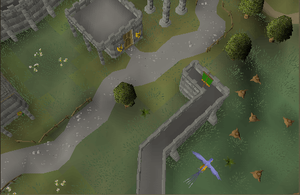
Varrock is situated in a forest, and while much of the area closest to Varrock has been deforested to make room for the city's expansion, many trees can still be found in and around it. Many regular trees can be found within the city, while many more can be found growing around it. Inside the city are four yew trees, three of which can be found behind the palace, making the area quite crowded, while the fourth is south of the Church of Saradomin. To the south of the city are many willow trees, while there are several oak trees directly southwest of the west bank. Additionally, to the east of the city are several more yew trees. Until recently, most of these trees were crowded with macros, but since the removal of unbalanced trade, most have left.
A tree patch is located within the Palace's outer walls, near the castle's east entrance. It allows members to grow wood trees.
Altars
Varrock has a total of three altars within its walls. The only gods with churches in the city are Saradomin and Zamorak.
Altars of Saradomin
- The Varrock Palace altar - located on the first floor, towards the rear of the palace
- Varrock chapel - located in the north-east corner of the city and presided over by Father Lawrence

Altars of Zamorak
- Altar of Chaos - located south of Aubury's Rune Shop in the south-east corner of the city. Players can talk to a Zamorak Mage here after completing his miniquest. The Wise Old Man came here in his youth days, as he grew up in Varrock, and wrote "Saradomin pwns" on the wall.
Bars
Varrock and the surrounding area has four bars. Most Varrockian bars sell only beer, but the Rat Pit Bar also sells stew.
The Blue Moon Inn
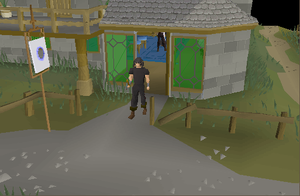
The Blue Moon Inn is a very popular bar in Varrock. One-Eyed Hector once stayed at the inn.
Players can find a couple of NPCs here besides the bartender, which include an unnamed Barbarian Woman, the ex-vampire slayer master Dr. Harlow, a very drunk man (who plays a part in the F2P quest Vampire Slayer), A Tramp in the back room of the store, and the fat Johnny the Beard (who drops the Intel Report, used for Shield of Arrav). During Garden of Tranquility, you discover that the Queen of Varrock once worked in the Blue Moon Inn as a barmaid.
Prior to the release of RuneScape 2, The Blue Moon Inn was a popular party spot for mid- to high-levelled RuneScape players. In fact, one could usually find a party there every night. This practice continued for a couple years into RuneScape 2, situated in worlds 1 and 3, but has since then died out, however there are a few clans dedicated to reviving this practice.
Dancing Donkey Inn
The Dancing Donkey Inn is unknown to most of Varrock because it is in the corner of the city where only members may buy goods. Unlike the Blue Moon Inn, it does not double as a hotel.
While there, players may stumble upon the three drunken NPCs here: Hops, too drunken to speak; Da Vinci, who hates non-members; and Chancy, who loves to gamble.
This is one of the locations visited in the Alfred Grimhand Barcrawl miniquest.
The Jolly Boar Inn
The Jolly Boar Inn is actually outside the Varrock city walls, but is still considered a Varrockian bar because it is within the vicinity. Like the Blue Moon Inn, the Jolly Boar doubles as a hotel, and there is an occupant for a room, the very tired Johnathon (part of the Family Crest Quest).
There are many NPCs here, one woman, two men, and a Black Knight, though none of them are drunk.
Also prior to the release of RuneScape 2 (and in its early stages), Dr. Harlow could be found at The Jolly Boar Inn rather than the Blue Moon Inn.
This is one of the locations visited for the Alfred Grimhand Barcrawl miniquest.
Rat Pit Bar
The Rat Pit Bar can be found down the manhole in south-east Varrock, in the members-only portion. It is very small, and is mostly occupied with gamblers taking a break from the Rat Pits activities.
Guilds
Varrock plays home to two guilds, both of which can be found outside the city walls. At these guilds, experienced adventurers and residents gather to hone their skills and use their abilities. The bank in the Cooks' Guild is for paying members only.
Dungeons
Varrock's underground is an expansive one. Filled with dungeons, caverns, and tunnels, the city's reputation for adventure does not limit itself to the surface world. Often the city's underground proves to be the most exciting; and dangerous.
- Varrock Sewers - Varrock's largest dungeon, large enough to connect even to Edgeville Dungeon. With monsters with levels up to 42 such as moss giants wandering the dank passages, this is one of the most popular destinations in the city. Be warned, however: many lower levelled adventurers have lost their lives within. Found east of the Palace.
- Tunnel of Chaos - This reality-warping tunnel is the home of the Dagon'hai. This tunnel can be used as a shortcut to reach the Chaos altar. Found north-east of Varrock.
- Champions' Guild Basement - Beneath the Champions' Guild is the Champion's Challenge. Here some of the world's greatest warriors have gathered, each seeking to bring honour and power to their race.
- Rat Pits - Perhaps the most disreputable spot in the whole city, this may be an off-shoot of the Varrock Sewers. It is now the home of a catfighting ring, where cats attempt to kill rats the fastest. Inhumane, illegal, and largely secret, it is here that many gamblers wind up completely broke, all of their belongings (including their clothes) gambled away, their cats killed in the Pits. Found in Varrock's south-east.
- Dungeon of Tolna - Tolna left his mother when he was a boy, seeking adventure. He fell into a crevice, where he was trapped for many years. An evil emanating from the Digsite drove him insane, his twisted mind creating a cave system unlike any other. Found near the path to Paterdomus.
- Phoenix Gang Hideout - It is in this small dungeon that the Phoenix Gang makes its base. Here some of the city's most wanted criminals can be found. Found in the city's south side.
Other Buildings of Interest
Grand Exchange
The Grand Exchange allows players to post trades accessible across all servers. Members have up to six slots to trade, while non-members have two. This large plaza, found in the north-west of the city, is the largest marketplace in the known world. It has become very popular and has become the new trading post, trading items in the Grand Exchange and beside it.
Paterdomus
The Paterdomus Temple was constructed hundreds of years ago, some time after the God Wars. It was at this location that six of the Seven Priestly Warriors of Misthalin were slain during a massive battle as they held back the invading forces of Morytania, who had recently conquered Hallowvale. Only Ivandis Seergaze survived.
The Paterdomus Temple, which is found at the end of a long, winding path east of Varrock, was constructed over a small section of the River Salve, and served as the first line of defence against the darkness beyond. The river was soon blessed to prevent the evil on the other side from crossing, and the Paterdomus became more of a symbol of Saradomin than an actual military outpost.
The temple was recently captured by Zamorakian priests who sought to re-establish contact with Morytania. One lone monk, Drezel, is the only remaining Saradominist priest at the Paterdomus.
Digsite
The Digsite is a large excavation area where archaeologists, scientists, and a few treasure hunters have gathered from all over Misthalin, Asgarnia, and Kandarin. The recently discovered ruins are all that remain of an pair of cities known as Senntisten and Saranthium. Senntisten was the most massive city in the history of Gielinor, and was said to stretch all the way from the Digsite to Edgeville. It was, to many archaeologists' interest, the capital city of the ancient god Zaros. Saranthium was built to cover up the evidence of the Senntisten.
Today, the ruins are excavated around the clock in search of ancient artefacts to ship to the Varrock Museum. Many items, including pottery, armour, altar pieces, bones, and gold can be found in large quantities in the area, and new discoveries are being made every day. However, some evil still seems to surround the area, as is evident in the nearby Dungeon of Tolna.
Varrock Palace
Varrock Palace is by far the city's largest structure, spanning three main floors and several massive towers. It is from the palace that King Roald and Queen Ellamaria rule Misthalin. The palace also houses the city's military, serving as Varrock's main defensive fortification. Within the palace politicians and diplomats from all over Gielinor gather, seeking to strengthen their bonds with the kingdom.
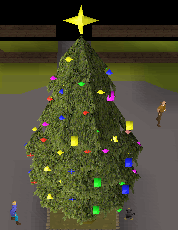
The palace contains a small chapel, where the city's nobility and warriors show their fealty to Saradomin. On the ground floor is the famous Library of Varrock, where scholars gather in droves to study from its many texts. Within the palace are many important features, including a dining area, the throne room, a kitchen, barracks, and nobles' rooms. Outside the palace is a large garden.
Surrounded by stone walls, sentries, spear walls, trenches, and barricades, to claim the palace would be nearly impossible for invaders. Towering high into the sky, the palace serves as a constant reminder to the city's enemies and as a sign of the might of the human race.
Varrock Museum
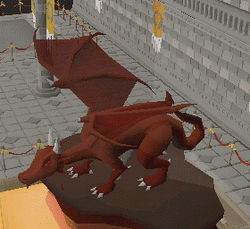
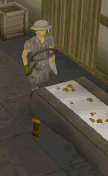
The Varrock Museum is the largest (and one of very few) museums in RuneScape. Until recently, it had very few exhibits on display, and was an area avoided by most. However, city's government recently donated a massive sum of money to the museum, which has allowed it to expand into RuneScape's most history-rich area.
The Varrock Museum receives many of its artefacts from the Digsite. In fact, the museum's ground floor is dedicated entirely to the Digsite's finds, with many coins, tablets, and pottery on display. There is also a specimen cleaning area, where players who have passed their archaeological exams may clean rock samples in search of artefacts.
The second and third floors contain cases dedicated to the history of RuneScape, arranged in a convenient timeline format. The timeline, which begins at the beginning of the First Age and stretches on all the way to the present day. The underground area of the museum, meanwhile, houses life-size clockwork displays of some of RuneScape's creatures, with information ranging from the simple monkeys of Karamja to the extinct dragon-like wyverns. Players with helpful information may also contribute to the museum.
Stone Circle
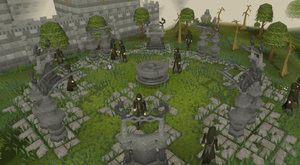
The Stone Circle south of Varrock was once owned by the Druids of Taverley, a group of Guthixians that sought to create a place of worship in the city. It was recently captured and corrupted by Zamorakian dark wizards, who are now using it for their dark purposes. It was here that the demon Delrith was summoned and slain by a heroic adventurer. The circle plays an important role in the Demon Slayer quest.
Its position near one of Varrock's main southern roads has made it notorious amongst low levelled players. A popular luring destination, many weaker players are tricked by higher levelled players to enter the circle, where they are attacked by the dark wizards and often killed. Others use the circle as a training area.
The druids of Taverley are attempting to reclaim the stone circle. They assign the adventurer to get them some meat, and then dip it in the Cauldron of Thunder. This was the quest to start Herblore, a members only skill that allows you to create potions.
In RuneScape Classic, it was located significantly further to the south-east. Since Runecrafting wasn't released until RuneScape 2, this was a popular place to collect chaos runes to sell or train magic.
Quests
Many quests can be started in or around Varrock. These quests are listed below.
Free Quests
- Shield of Arrav may be started by speaking to Reldo in the palace library or Charlie the Tramp south of the Sword Shop,West of Blue Moon Inn.
- Demon Slayer is started by speaking to the Gypsy who is in her tent, at Varrock's central square.
- Romeo & Juliet used to be started by talking to Romeo, who wandered around the central fountain, but the quest has been removed and replaced by Gunnar's Ground, which is started in Barbarian Village
- Dragon Slayer may be started by speaking to the Guildmaster of the Champions' Guild to the south of Varrock.
Members-Only Quests
- A Soul's Bane may be started by speaking to Launa at the "Rift" entrance, north-west of the Dig Site.
- Family Crest is started by speaking to Dimintheis, in the south-eastern corner of Varrock.
- Gertrude's Cat is started by speaking to Gertrude who resides in her house along the path that leads to Gunnarsgrunn.
- Garden of Tranquillity is started by speaking to Her Royal Highness, Queen Ellamaria, in the palace garden.
- Priest in Peril is started by speaking to King Roald in the palace.
- Rat Catchers may be started by speaking to Gertrude while a cat or kitten is following the player.
- What Lies Below is started by speaking to Rat Burgiss, who is found along the halfway along the road between Varrock's southern entrance, and Lumbridge.
- Defender of Varrock can be started by speaking to Captain Rovin, who can be found in Varrock Palace.
- Druidic ritual concerns the stone circle at Varrock's south gate, but you do not actually enter Varrock.
- All Fired Up can be started by talking to King Roald
Varrock Tasks
There is also a list of tasks for Varrock, which gives Varrock armour for a reward.
Mini-Quests
Monsters
- Rats (Level 1)
- Men and Women (Level 2)
- Mugger (Level 6)
- Barbarian Woman (Level 9)
- Thieves (Level 16)
- Monk of Zamorak (Level 17)
- Guards (Level 21)
- Outlaws (Level 32)
- Black Knights (Level 33)
- Lucien (Level 14, only fought during Temple of Ikov)
- Giant Rat (Level 3 or 6)
- King Roald (Level 41, only fought during What Lies Below)
- Armoured zombie (Level 85, only fought during Defender of Varrock)
Many more monsters can be found wandering outside the city, and in the city's expansive underground network of pipes and sewers.
- Deadly red spiders (Level 34)
- Scorpions
- Zombies
- Skeletons
- Ghosts
- Moss Giants (Level 42)
Personalities
Varrock's population far surpasses that of most cities. The city's size has attracted a very diverse population, ranging from sophisticated nobles to pirates. Click the above article for a list of non-attackable characters that can be found within the Varrock, along with a brief description.
Miscellaneous
Anvils
Anvils are necessary during the smithing process. Varrock, a city that relies heavily on metalworking, contains a number of workshops and houses where anvils can be found.
There are three notable areas with anvils in Varrock. The first and most important can be found south of the city's west bank. Here, three anvils can be found, all very close to the bank. Because of this, it is often crowded with smiths. Another can be found north-west of the east bank, in Horvik's Armoury. A third, seldom used anvil can be found south of the east bank (behind the crossbow store) in a small house.
Ranges
Ranges are located in houses, bars, and kitchens all over Varrock, totalling out to over ten. The best one for cooking (nearest to a bank) is the one to the south-west of the east bank.
Several ranges can also be found in the Cooking Guild. If the Varrock Tasks have been completed, players can use the range found within the guild's bank. This is the closest range to a bank in Gielinor. Some players prefer using the Lumbridge range, as it has the lowest chance of burning, and it is most likely the next closest location.
Water Sources
Players can obtain water from sinks, fountains, and wells all over Varrock. With seven sources throughout the city, water is never in short supply. The most convenient can be found in the Grand Exchange.
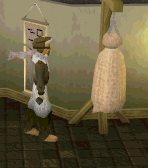
Combat Training
Low level players can raise their combat level by hitting dummies north of the east bank and in the castle. There was a popular location for the wine trick, but Jagex changed the wines, the wines can only decrease your attack to a limited level, now the place is unpopular.
Varrock Library
Varrock Library is famous for its large collection of texts. It is here that scholars from all over Gielinor gather in their pursuit of knowledge. Players may read a number of books in the library, including texts that concern Arrav, the history of the goblin race, and others. It also has info on craft making. This is located on the ground floor on the north side of the Varrock Palace.
Agility Shortcut
Located at the north-west of the Grand Exchange, this exits near Edgeville.
Earth Altar
The Earth Altar can be found in the forest north-east of Varrock, near the beginning of the pathway to the Paterdomus Temple. Here players can craft earth runes.
Air Altar
The Air Altar can be found on the road from Varrock to Gunnarsgrunn, next to Gertrude's house. Here players can craft air runes.
Music
The following music can be unlocked in Varrock. This list does not include quest-specific tracks.
- Adventure (Varrock Palace)
- Cellar Song (Varrock West bank vault)
- Expanse (Stone Circle)
- Garden (Varrock centre)
- Greatness (Near the Champions' Guild)
- Looking Back (Varrock Museum)
- Medieval (Varrock east)
- Parade (Jolly Boar Inn/Paterdomus Path)
- Rat a Tat Tat (Varrock Rat Pits)
- Spirit (Varrock west)
- Still Night (South-east Mine)
- The Trade Parade (Grand Exchange)
Events
Although most player-initiated riots and events take place in Falador, several notable events have taken place in Varrock.
- On 6 June 2006, a glitch gave several players the ability to attack players outside player-versus-player areas. A small amount of this glitch, dubbed the World 111 Glitch, occurred in Varrock, although it was most concentrated in Edgeville and Falador.
- On 2 January 2007, a small riot took place in World 81 as part of the Rule Seven Protest.
- Beginning on 10 December 2007, many small protests and riots occurred in Varrock, a side-display of the Pay to PK Riot that raged in Falador for roughly seven days.
- On 2 and 3 January 2008, 01:00 UTC, the Unbalanced Trade Riot began in Varrock Square in World 1. The riot was comparatively small to the Pay to PK Riot that had been taking place as part of the Aftermath of the Bounty Hunter update, but was the first riot solely targeting the removal of unbalanced trade.
- On 4 and 5 June 2008 the Wilderness Riot, a continuation of the Pay to PK Riot, occurred in Varrock square in worlds 1 and 2.
Trivia
- There was a glitch in the basement of the western bank in Varrock during 2006 where players could see other players outside the map. This was fixed a few months later.
- During the Perils of Ice Mountain quest, the Oracle says Varrock will turn into a desert unless the power machine is turned off.
- The stairs in Varrock’s west bank no longer descend into a grey/white void due to an update on 9 November 2009.
- One of the sleeping church-goers in the Varrock church is named "Jeremy Clerksin", which is a play on the name Jeremy Clarkson (a UK television personality who is notable for his role in "Top Gear").
- There have been 3 different versions of the flags in Varrock; the first was the Misthalin flag, then a green and gold version, now the current gold and brown flag.
- The northeastern church's top floor is higher than Ice Mountain.
- The banker in the west bank behind the door nearly says "Doctor Who" in response to one of the player's jokes, which is a reference to the popular British TV show Doctor Who.
- The house where Juliet and her family used to live is now the home of Dororan and his wife Gudrun after the completion of Gunnar's Ground.
- Varrock has shops with weapons for all three types of combat from the combat triangle.
- When RuneScape was first released, the Fancy Clothes store in Varrock's south-east area stocked red partyhats; however, this was simply a placeholder and the partyhats were never in stock. Some players waited for a long period of time to see if red partyhats would restock, but they never did and the placeholder was later removed due to complaints about players' time being wasted.
See also
References
Template:Featured article pt:Varrock nl:Varrock de:Varrock pl:Varrock af:Varrock no:Varrock es:Varrock zh:維洛克 fi:Varrock